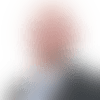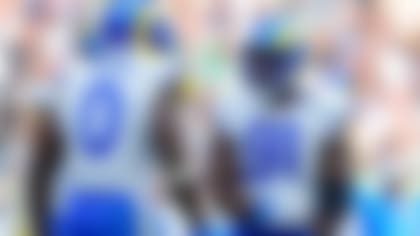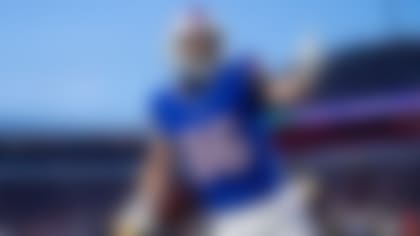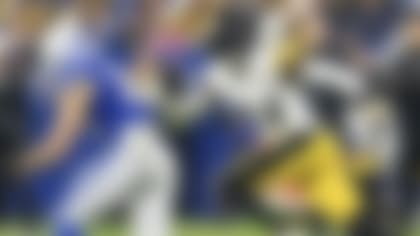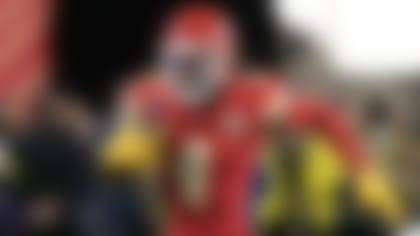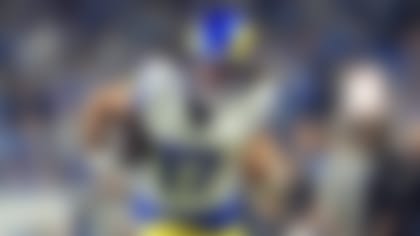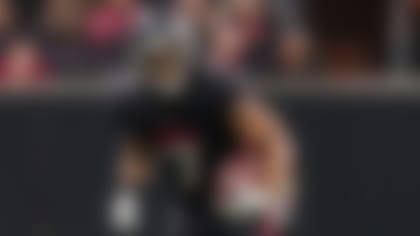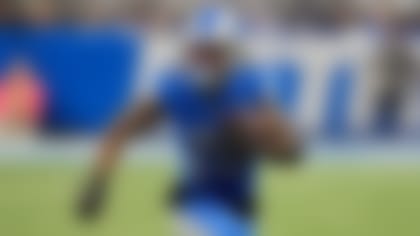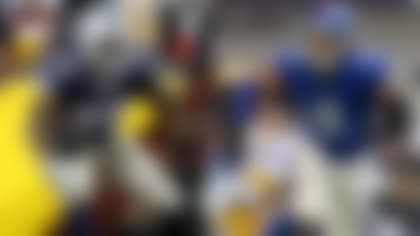Super Bowl LVI's in the books, ending the longest season in 国产外流网history. How did the new guys perform in the expanded 285-game slate? Gennaro Filice and Nick Shook are taking a division-by-division look at each team's rookie class, providing grades and analysis on Year 1 production. Shook examines the AFC East below.
Round 1
- (No. 12) Micah Parsons, LB, 16 games/16 starts
Round 2
- (44) Kelvin Joseph, CB, 10 games/2 starts
Round 3
- (75) Osa Odighizuwa, DT, 16 games/12 starts
- (84) Chauncey Golston, DE, 15 games/0 starts
- (99) Nahshon Wright, CB, 13 games/1 start
Round 4
- (115) Jabril Cox, LB, 7 games/0 starts
- (138) Josh Ball, OT, 0 games
Round 5
- (179) Simi Fehoko, WR, 5 games/0 starts
Round 6
- (192) Quinton Bohanna, DT, 14 games/1 start
- (227) Israel Mukuamu, S, 4 games/0 starts
Round 7
- (238) Matt Farniok, OG, 12 games/0 starts
Dallas hit a 450-foot home run with its selection of Parsons, going best player available over clear need at 12th overall and reaping the rewards. Parsons won Defensive Rookie of the Year and earned first-team All-Pro and Pro Bowl honors, completing a trifecta that has him entrenched as a key defensive star for years to come. Most of Dallas' positive grade is built on the massive success of the Parsons pick, as it's more of a "B" class without the star linebacker. Joseph spent most of his rookie season on special teams before stepping into a defensive role, performing well in limited snaps late in the season. Odighizuwa played in all but one game, recording two sacks and 36 tackles (six for loss). His defensive snap counts tailed off as the season wore on, and he didn't draw a strong Pro Football Focus grade, but he did produce an optimistic outlook. Golston was another rotational player who saw on-field time early and made consistent contributions despite watching his snaps fluctuate. Wright was drafted as a developmental corner who could eventually help fill the void left by Chidobe Awuzie's departure, though he spent almost all of his rookie season on special teams. Cox played primarily special teams and suffered an ACL tear in October. He carries promise into his second season, provided he can return to form after knee rehab. Ball arrived with the hopes of providing depth at tackle but landed on injured reserve with an ankle injury and didn't play in 2021. Fehoko was intriguing during the preseason but ended up not factoring into the offense due to the logjam of talent at receiver, playing 48 of his 55 total snaps on special teams. Like Odighizuwa and Golston, Bohanna saw a decent amount of playing time and is an exciting prospect. Mukuamu was drafted to help in the future and played most of his snaps on special teams. Farniok also spent most of his time on special teams but could end up being valuable for depth.
Round 1
- (No. 10) DeVonta Smith, WR, 17 games/16 starts
Round 2
- (37) Landon Dickerson, OL, 14 games/13 starts
Round 3
- (73) Milton Williams, DT, 17 games/2 starts
Round 4
- (123) Zech McPhearson, CB, 16 games/1 start
Round 5
- (150) Kenneth Gainwell, RB, 16 games/5 starts
Round 6
- (189) Marlon Tuipulotu, DT, 5 games/0 starts
- (191) Tarron Jackson, DE, 17 games/0 starts
- (224) JaCoby Stevens, LB/S, 2 games/1 start
Round 7
- (234) Patrick Johnson, DE, 17 games/2 starts
Notable Undrafted Free Agent
- Jack Stoll, TE, 16 games/5 starts
Smith was what Jalen Reagor could not be in 2020: a difference-making rookie receiver. Smith averaged 14.3 yards per reception, flirted with 1,000 yards and caught five touchdowns to kick off a career filled with exciting potential. He's the jewel of this class for Philadelphia and might have beaten out Jaylen Waddle for a spot on the Pro Football Writers of America All-Rookie Team if Philadelphia had a better passing offense. Dickerson was forced into action early in the season and ended up exceeding expectations, ranking among the top 25 guards in PFF grades and building a case for optimism going forward (PFF lists him as Philadelphia's for 2022) -- the Eagles certainly have their starting left guard. Williams played over 450 defensive snaps, recording two sacks and six tackles for loss. and has a promising future. McPhearson played mostly special teams, but he did record a pass defensed in limited defensive action. Gainwell was a very exciting, versatile playmaker who rushed for over 4 yards per carry and five rushing touchdowns. He also caught 33 passes for 253 yards and another score in Philadelphia's backfield rotation. Tuipulotu didn't see the field much, playing just 66 snaps combined between defense and special teams. Jackson played nearly a quarter of the Eagles' defensive snaps as a rotational edge rusher and is in line for a larger role, with the roster likely turning over to younger players at his position. Stevens played in two games and spent most of his time on the practice squad, signing a reserve/future deal in January. Johnson saw time with the defense early but ended up being primarily a special teams player. Stoll played nearly half of Philadelphia's total special teams snaps and caught a few passes in limited offensive action.
Round 1
- (No. 20) Kadarius Toney, WR, 10 games/4 starts
Round 2
- (50) Azeez Ojulari, OLB, 17 games/13 starts
Round 3
- (71) Aaron Robinson, CB, 9 games/2 starts
Round 4
- (116) Elerson Smith, OLB, 8 games/0 starts
Round 6
- (196) Gary Brightwell, RB, 13 games/0 starts
- (201) Rodarius Williams, CB, 5 games/0 starts
Notable Undrafted Free Agent
- Raymond Johnson III, DE, 15 games/0 starts
The Giants' entire 2021 season can be summarized by Toney's rookie season. The first-rounder struggled to stay on the field due to multiple injuries, but when he was available, he occasionally exploded, as in his 10-catch, 189-yard performance in Week 5. He just wasn't available enough to make a significant difference for a struggling offense that saw its coordinator fired during the season. Toney could still make this pick look like a home run, but there's a lot of boom-or-bust potential. The Giants nailed the selection of Ojulari, who led the team in sacks with eight and figures to be a key part of this defense for years to come. Robinson played nearly a quarter of New York's defensive snaps and might fill a bigger role in 2022, with James Bradberry potentially headed elsewhere due to cap constraints. Smith's season was shortened by injury, but he did force a fumble in his limited action. Brightwell spent most of his season on special teams, getting just two touches in 13 games. Williams' season ended due to a torn ACL suffered in Week 5. Johnson played a rotational role as an undrafted signee and will have to fight to stick with the Giants in 2022.
Round 1
- (No. 19) Jamin Davis, LB, 16 games/8 starts
Round 2
- (51) Samuel Cosmi, OT, 9 games/9 starts
Round 3
- (74) Benjamin St-Juste, CB, 9 games/3 starts
- (82) Dyami Brown, WR, 15 games/6 starts
Round 4
- (124) John Bates, TE, 17 games/8 starts
Round 5
- (163) Darrick Forrest, S, 8 games/0 starts)
Round 6
- (225) Camaron Cheeseman, LS, 17 games/0 starts
Round 7
- (240) Will Bradley-King, LB/DE, 3 games/0 starts
- (246) Shaka Toney, LB/DE, 10 games/1 start
- (258) Dax Milne, WR, 13 games/1 start
Notable Undrafted Free Agent
- Jaret Patterson, RB, 17 games/1 start
- Milo Eifler, LB, 3 games/0 starts
- Sammis Reyes, TE, 11 games/1 start
- Brian Johnson, K, 3 games/0 starts
Davis arrived with much fanfare, rocketing up draft boards thanks to his premier athleticism, but he was slow to adjust to the NFL. That doesn't mean his future isn't still bright; he just didn't provide the expected return as a rookie. Cosmi struggled with injuries, but not with performance, impressing evaluators with his run-blocking ability. He'll need to be better in the passing game, but he provided enough proof for PFF to name him as the Commanders' for 2022. St-Juste missed nearly half of the season due to concussions and finished on injured reserve but saw significant playing time in the first half of the season. He still has plenty of room for improvement, though the rave reviews he drew in training camp shouldn't go overlooked -- he just needs time to develop. Brown played less than 35 percent of offensive snaps and didn't live up to the hype as a rookie, but Taylor Heinicke's replacement of Ryan Fitzpatrick likely had something to do with that. Brown flashed his potential and could make progress in his second season. Bates stepped into a starting role following the loss of Logan Thomas and Ricky Seals-Jones to injuries, catching 20 passes for 249 yards and one touchdown. He could produce at a higher rate with a larger full-time role, if that's what the Commanders have planned for him.
Forrest played special teams almost exclusively in his first season and missed a significant portion of it due to injury. The only way we typically judge long snappers is by their mistakes, and Cheeseman didn't make them. Bradley-King was a late-season elevation from the practice squad and finished with a half sack and five tackles in just three games played. Toney finished with 1.5 sacks and could hang around as a rotational player, thanks to his special teams contributions. Milne sits at the bottom of the depth chart, but he could end up seeing a larger role if Adam Humphries heads elsewhere in free agency. Patterson was an incredible collegiate rusher but didn't see a ton of touches at the next level. Still, he flashed in brief moments, scoring two touchdowns on 78 total touches while playing behind Antonio Gibson and J.D. McKissic. Eifler exclusively played special teams in his three games. Reyes was primarily a special teams player, as well, appearing in over 50 percent of such snaps. Johnson signed with Chicago, then went to New Orleans and back to Chicago before he arrived in Washington after an injury to Joey Slye. He converted both of his two field-goal attempts, including a game-winning 48-yarder against Las Vegas in Week 13.
Follow on Twitter.
